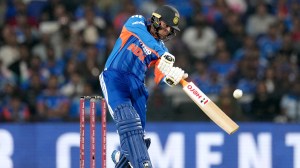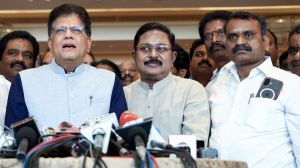Writing the Wrongs
CALL it a feel-good book with ambitions. Garvi Gujaratna Gauravvanta Muslimo Honourable Muslims of Glorious Gujarat has multiple purposes:...

CALL it a feel-good book with ambitions. Garvi Gujaratna Gauravvanta Muslimo Honourable Muslims of Glorious Gujarat has multiple purposes: Stringing together achiever-narratives of a particular community, providing a positive image to the 8216;8216;other8217;8217;, and, grandest of all, bridging a divide that is forever threatening to deepen in the state.
That might be some time coming but, for starters, Garvi Gujaratna8230; has blurred the lines between propaganda and positivism. 8216;8216;It8217;s a must-read, especially for Hindus in the state,8217;8217; says Gunvant Shah, noted Gujarati columnist. Rave reviews for the book have also appeared in literary magazines like Naya Marg and Nirikshak.
For its writer and publisher Akbar Ali Saiyed, the praise is vindication of the indignation that prompted him to pick up his pen 13 years into retirement. 8216;8216;I lived in Juhapura, Ahmedabad, during 2002, and was aghast at the negative depiction of Muslims in post-riots Gujarat. In the media and in the local mindset, the community was illiterate, violent, unclean, unpatriotic,8217;8217; says Saiyed, 75.
SO upset was the former government servant that he decided to counter the mindset in the only way he knew: By writing. For the first time in his life, this occasional poet went out into the streets, among his people, to talk to them, learn their stories and profile their achievements.
Supported by the Gujarat Vishwa Kosh Trust, which allowed him free access to their resources, as well as friends, well-wishers and community organisations, Saiyed spent 23 months meeting or learning about Muslims who had made a difference in fields as diverse as social work, sports, politics, medicine, literature and music from 1869 when Mahatma Gandhi was born to the present day.
8216;8216;Though Muslims may be poor, socially backward and less literate than other communities, it does not mean they are unpatriotic,8217;8217; says Saiyed. 8216;8216;I thought it my religious duty to focus on their positive contributions.8217;8217;
So, alongside cricketer Irfan Pathan and weightlifter Nilofer Chauhan, Saiyed profiles Babubhai Ismail Qureshi, who nurses a passion for cycling, and Keshubhai Qureshi, who works with stray animals and accident victims. 8216;8216;I specially wanted to write about the common man. Only their contributions can remove false notions about Muslims,8217;8217; says Saiyed.
Released in April this year and priced at Rs 100, 80 per cent of the first run of 1,000 copies sold out within months. The Rajkot-based Saiyed is now planning a five-volume series.
Many of the names that will feature in the second book came from well-wishers like Gunvant Shah, who wrote the foreword for the first volume. 8216;8216;I do not know Maulvi saheb at all,8217;8217; says Shah, making the common mistake of interpreting Saiyed8217;s skull cap and flowing beard as signs of his priesthood. 8216;8216;His efforts were brought to my notice by a friend.8217;8217;
Interestingly, Shah is a critic of what he calls the 8216;8216;secular brigade8217;8217;8212;the sections of the media and NGOs which, he believes, went in for minority appeasement in the post-riots months8212;and continues to be semi-hardline in his writing.
8216;8216;But efforts such as Saiyed8217;s need to be encouraged,8217;8217; Shah says. 8216;8216;It8217;s the only way to build broken bridges.8221;
To that end, he wrote an article on the book for the third volume of Addhi Sadini Vachanyatra, a best-selling anthology of literature edited by well-known Gujarati writer Mahendra Meghani.
8216;8216;It is a shame people do not know about the positive contribution of Muslims,8217;8217; says Meghani. 8216;8216;The book should be promoted in a big way.8217;8217;
- 01
- 02
- 03
- 04
- 05






























